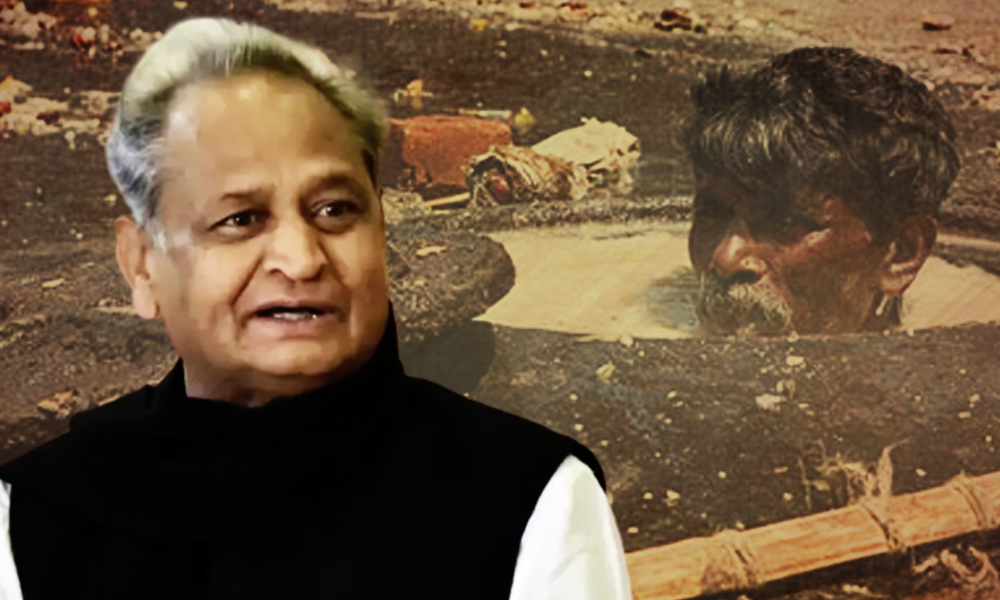
Image Credit: Wikimedia
Rajasthan Government Prohibits Manual Scavenging Of Septic Tanks, Sewage Chambers
Writer: Sumanti Sen
Sumanti Sen is an English Literature graduate who believes "there's just one kind of folks. Folks.".
Rajasthan, 7 July 2020 8:29 AM GMT | Updated 7 July 2020 12:21 PM GMT
Editor : Shubhendu Deshmukh |
Shubhendu, the quint essential news junky, the man who loves science and politics in equal measure and offers the complete contrast to it by being a fan of urdu poetry as well.
Creatives : Abhishek M
" An engineer by profession, Abhishek is the creative producer of the team, graphic designing is his passion and travelling his get away. In more ways than one, he makes the content visually appealing."
The Rajasthan government in an order on Monday, July 6, directed officials concerned to ensure that septic tanks or sewage chambers are cleaned using machines.
Ashok Gehlot-led Rajasthan government has prohibited manual scavenging of septic tanks or sewage chambers in the state in an order on Monday, July 6.
The state government directed officials concerned to ensure that septic tanks or sewage chambers are cleaned using machines.
"All district collectors and city corporation officials have been ordered to ensure that no worker has to get inside the chamber for cleaning. This work should be ensured completely through machines. No incident of any death because of getting inside the chamber for cleaning of sewerage should happen," India today quoted Rajasthan Chief Minister, Ashok Gehlot, as saying.
People's Union for Civil Liberties (PUCL) welcomes the decision to prohibit manual scavenging of septic tanks or sewerage.
In a statement, the PUCL mentioned, "This decision of the state government is extremely commendable and is a big victory for the cleanliness worker agitation."
Ashok Gehlot lauded the contribution of sanitation workers towards preventing the spread of COVID-19 infection in the state.
Because of the spirit of dedication with which cleanliness workers and people's representatives of city corporations have worked, we have been successful in stopping the spread of corona infection. In the fight against corona along with doctors, nursing personnel, Anganwadi workers and police, their effort has raised the stature and respect of Rajasthan in the country," the Rajasthan Chief Minister said.
Manual Scavenging Banned In India
Manual scavenging is banned in India. Any contact between excreta and a labourer employed to unclog a drainage pipe or sewage treatment plant is prohibited by law and the occurrence of such a trespass or the non-provision of safety gear or disinfectants to the labourer will lead to the prosecution of the contractor and the employer.
In March 2014, the Supreme Court declared that there were 96 lakh dry latrines being manually emptied. And as per reports received from the States and Union Territories in 2016, 12,226 manual scavengers have been identified so far.
According to a report tabled in the Rajya Sabha in 2016, 22,327 lose their lives every year due to manual scavenging. The Supreme Court had directed authorities to pay a sum of Rs 10 lakh to the affected families; however, the families had received only about Rs 60,000.
Manual Scavenging Continues In India
Despite the Prohibition of Manual Scavengers Act, manual scavenging is still prevalent at places which lack sewage systems or safe faecal sludge management practices.
The major reason for the continued existence of manual scavenging is because of latrines without water supply, where the excreta is picked up by the scavengers. Another reason for the continued existence of manual scavenging is the Indian Railways. Many train carriages have toilets dropping the excreta from trains on the tracks; scavengers are employed to clean these tracks manually.
A letter was sent to the Delhi government on January 21, 2019, by the National Human Rights Commission, over the death of a contractual sanitation worker who died in Wazirabad while cleaning a drain. A notice was issued to the Delhi Chief Secretary, asking him to submit a detailed report of the death as well as similar incidents in the last two years. The report should further specify the legal action taken against those who employed the worker and made him work without head protection. Steps taken to stop such incidents in the future should also be mentioned.
Maximum deaths of manual scavengers are reported from Tamil Nadu. In January 2019, Manhar Valibhai Zala, the Chairperson of the National Commission for Manual Scavengers (NCSK-National Commission for Safai Karamcharis) and the members from the associations of manual scavengers across the state was arranged in Chennai.
In the meeting, Zala said that a survey will be ordered to find out the people involved in all kinds of manual scavenging, and the stipends issued, medical insurance, regular medical checkups, proper sanitation equipment provided manual scavengers will be monitored.
Also Read: Bengaluru: Death Of Teenager Who Went Inside Septic Tank For ₹600 Sparks Outrage
 All section
All section














